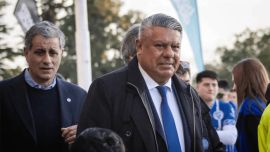Argentina's World Cup qualifying clash against arch-rivals Brazil was dramatically suspended shortly after kick-off on Sunday as controversy over Covid-19 protocols erupted.
Amid farcical scenes at São Paulo's Neo Quimica Arena, the match between the two giants of South American football came to a halt after just seven minutes, when a group of public health officials came onto the pitch, triggering arguments between team staff, players and the local officials.
Argentina's players trudged off the pitch to the locker room as the furore raged on. Albiceleste captain Lionel Messi later re-emerged from the tunnel without his team shirt on as confusion swept around the stadium.
CONMEBOL, South American football's governing body, later confirmed that the match had been suspended and said the onus is on FIFA – as the competition's organiser – to decide next steps.
"By decision of the match referee, the match organised by FIFA between Brazil and Argentina for the qualifiers for the the World Cup is suspended," CONMEBOL said in a statement. "The referee and the match commissioner will submit a report to the FIFA Disciplinary Committee, which will determine the steps to follow. These procedures adhere strictly to current regulations."
The stunning development came just hours after Brazil's health authorities said four players in Argentina's squad based in England should be placed in "immediate quarantine" for breaching Covid-19 protocols.
According to Brazil's National Health Surveillance Agency (ANVISA), Premier League players Giovani Lo Celso, Cristian Romero (both Tottenham Hotspur), Emiliano Martínez and Emiliano Buendía (both Aston Villa) provided "false information" upon their entry to Brazil.
Romero, Lo Celso and Martínez were all in the Argentina starting line-up that kicked off Sunday's game – triggering the intervention onto the field of officials wearing ANVISA shirts.
According to reports, the four Premier League players have been accused of failing to disclose that they had spent time in the United Kingdom in the 14 days prior to their arrival.
"We got to this point because everything that ANVISA directed, from the first moment, was not fulfilled," ANVISA director Antonio Barra Torres said on Brazilian television. "[The four players] were directed to remain isolated while awaiting deportation, but they did not comply. They went to the stadium and they entered the field, in a series of breaches," the official added.
A government order dating from June 23 prohibits the entry into Brazilian territory of any foreign person from the United Kingdom, India or South Africa, to prevent the spread of variants of the coronavirus.
"ANVISA considers that this situation represents a serious health risk and recommends that the local health authorities [of São Paulo] order the immediate quarantine of the players, who are prohibited from taking part in any activity and from remaining on Brazilian territory," the agency said in a statement.
ANVISA said Brazil's Federal Police had been notified so that "the necessary measures are taken immediately."
With the game apparently abandoned, Brazil's squad began a practice game on the arena with Argentina's team having reportedly left the stadium.
Brazilian website Globoesporte said the Argentina Football Association (AFA) could request an exceptional authorisation from authorities in São Paulo to allow the players to take the field against Brazil.
The controversy comes after nine Brazilians based in the Premier League failed to travel to South America following objections from their clubs.
Sunday's clash was set to be the first meeting of the two South American giants since the Albiceleste defeated Brazil in the Copa América final on July 10 in Rio de Janeiro.
– TIMES/AFP


























Comments